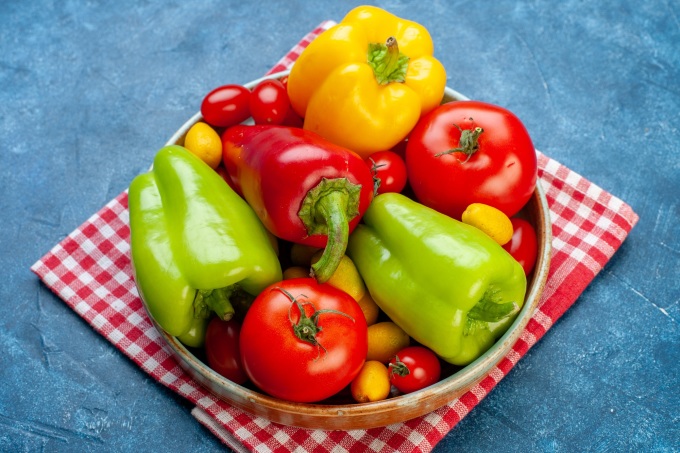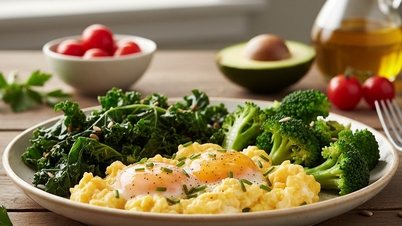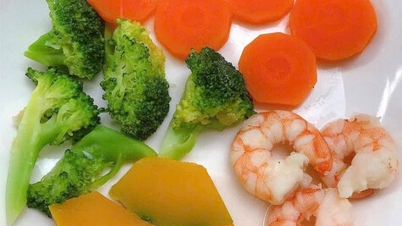Garlic, onions, carrots, green leafy vegetables, bell peppers… are vegetables that are not only nutritious but also contain substances that help reduce inflammation and prevent aging.
Inflammation occurs when a person is injured or sick. Inflammation becomes chronic when the body continues to show signs of inflammation even in the absence of injury. Causes may include autoimmune disorders, excessive alcohol consumption, stress, and smoking.
Chronic inflammation is also closely linked to aging. A report published in the journal Aging and Disease , a division of the National Institutes of Health, found that untreated inflammation can accelerate aging and increase the risk of age-related diseases. A healthy diet rich in beneficial foods can help reduce inflammation and slow the aging process. Here are some typical vegetables.
Carrot
Raw or cooked, carrots are packed with nutrients, some of which may have anti-inflammatory properties. Carrots are high in beta-carotene (a carotenoid that the body uses to make vitamin A), which supports bone and skin health, especially as we age. Vitamin A has also been shown to have anti-inflammatory benefits.
According to a review published in the Journal of Functional Foods , carrots can reduce inflammation and oxidative stress in the body, thereby boosting immunity.
Broccoli
Broccoli is a nutrient-rich vegetable that may help slow the progression of age-related diseases linked to chronic inflammation. A study published in the medical journal Clinical Nutrition found that sulfurophanes, natural antioxidants found in broccoli, may reduce inflammation.
Broccoli is also high in calcium, fiber, and contains a moderate amount of water, which contributes to the vegetable's anti-inflammatory properties.
Bell pepper
According to the nutritionists at Eat This Not That , the nutrients in bell peppers provide benefits in controlling inflammation to slow down the aging process. Bell peppers are rich in vitamin C and vitamin A (which are natural antioxidants), fiber, and water. The high antioxidant content in bell peppers also helps reduce inflammation in the body.

The nutrients in bell peppers provide benefits in controlling inflammation to slow down the aging process. Photo: Freepik
Potato
Potatoes contain fiber, potassium, and vitamin C, which can fight free radicals. Potassium has been shown to help reduce inflammation and pain, especially in people with rheumatoid arthritis. Potatoes' high fiber content has also been linked to reduced inflammation in the body.
Green leafy vegetables
Green leafy vegetables are listed as useful anti-inflammatory foods because of their high content of antioxidants and polyphenols. Typical vegetables such as spinach, kale, lettuce, lettuce are rich in vitamins, minerals and antioxidants, which play an important role in reducing the symptoms of inflammation. They also provide the body with vitamins (A, C, E, K), iron, potassium, calcium, magnesium and fiber.
Garlic
Garlic not only adds flavor to food but also has many health benefits, including reducing inflammation. Garlic is made up of organosulfurs - sulfur-containing compounds. A report published in Anti-Cancer Agents in Medicinal Chemistry concluded that these organosulfur compounds help boost the immune system and prevent the growth of cancerous tumors.
Onion
This root vegetable offers a variety of helpful anti-inflammatory nutrients. Onions are rich in potassium and an antioxidant called quercetin. According to Nutrients , quercetin has properties that benefit immunity and reduce inflammation, and may even help reduce symptoms of some autoimmune disorders.
Bao Bao (According to Eat This Not That )
Source link



![[Photo] Prime Minister Pham Minh Chinh chairs the Conference to deploy the National Target Program on Drug Prevention and Control until 2030](https://vphoto.vietnam.vn/thumb/1200x675/vietnam/resource/IMAGE/2025/10/09/1759990393779_dsc-0495-jpg.webp)

![[Photo] Prime Minister Pham Minh Chinh chairs a meeting of the Government Standing Committee on overcoming the consequences of natural disasters after storm No. 11](https://vphoto.vietnam.vn/thumb/1200x675/vietnam/resource/IMAGE/2025/10/09/1759997894015_dsc-0591-jpg.webp)






























































































Comment (0)